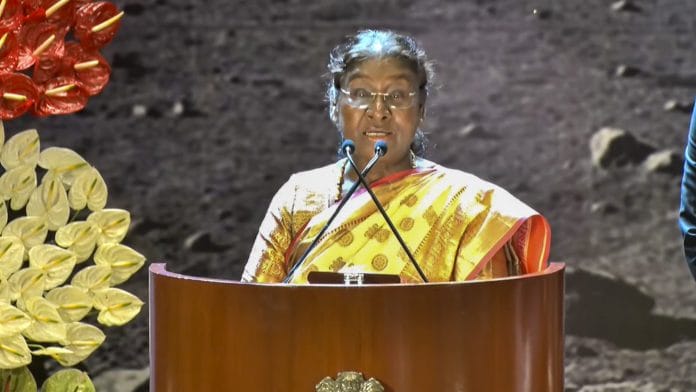New Delhi: India is preparing to achieve a “zero space debris” target by 2030, an initiative imperative to the success of future space missions, President Droupadi Murmu said Friday.
Addressing the first National Space Day — a day to mark India’s successful landing on the Moon last year — President Murmu said that debris would be a potential risk in the future. “We need to be prepared for future challenges as well,” she said.
The President added that to address this problem, India has set up a dedicated facility in Bengaluru, the ISRO System for Safe and Sustainable Operations Management.
“This is an appreciable effort. I am also happy to note that ISRO has set a target of 2030 to make its missions debris-free,” the President said.
Why is space becoming crowded?
While space exploration has become one of the primary investments for countries across the world in recent years, this increased interest is also resulting in space becoming more crowded.
Objects such as artificial satellites and bits from crafts that have fallen out of use have cluttered space — increasing the risk of collisions.
In 20 years of its operations, America’s International Space Station has had to shift over 30 times to avoid being hit by orbital debris.
Last year, the National Aeronautics and Space Administration (NASA) called private partners and research institutes to find solutions to detect, track and clean up small space debris.
“As humanity’s presence in space has expanded, so has the number of objects orbiting Earth. There are currently millions of tiny objects (between 1mm and 10cm, or just under 4 inches) in LEO. This debris can travel at high speeds, posing potential risks to current and future spacecraft,” NASA said in a statement released in September last year.
It added, “The United States Space Surveillance Network tracks larger debris, but the network does not currently track and monitor small objects. A more robust, scalable system is needed to successfully detect, track, and remediate small space debris.”
India’s plans
In April this year, the Indian space agency committed to undertaking debris-free space missions by 2030. ISRO chairperson S. Somanath told ThePrint that steps towards attaining this target had already begun.
ISRO has been bringing back satellites that have surpassed their mission life instead of allowing them to float in space.
“This initiative aims to achieve debris-free space missions by all Indian space actors, governmental and non-governmental, by 2030. India also encourages all other state space actors to follow this initiative for the long-term sustainability of outer space,” Somanath had said.
ISRO officials said the initiative aimed to avoid debris generation during the operational life of satellites and launch vehicles, as well as during the post-mission disposal phase; circumvent on-orbit collision and break-up of satellites and launch vehicles through necessary failure-mode studies; return redundant systems to Earth and design missions with high reliability, and stop intentional break-ups with long-lived debris.
(Edited by Tikli Basu)
Also read: To avoid eclipses, joint NASA-ISRO observatory NISAR won’t take flight before February 2025






